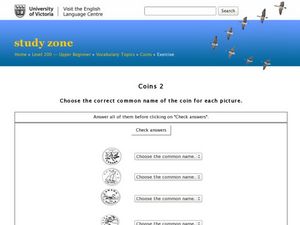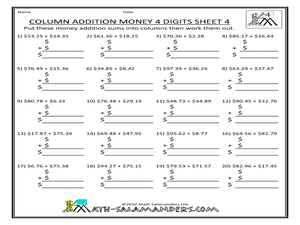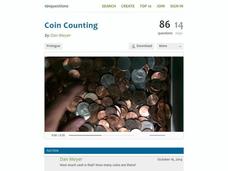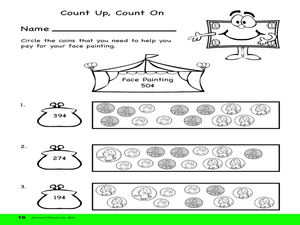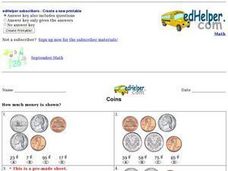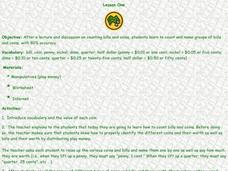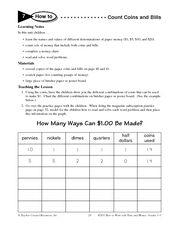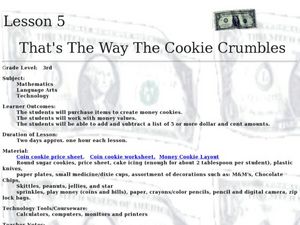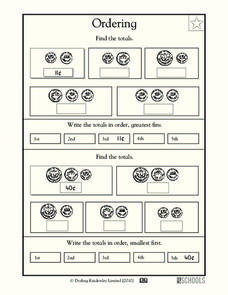Curated OER
Value Your Digits
Third graders work with place value. In this place value lesson, 3rd graders write three digit numbers and tell the place value of each number. They compare numbers and money, regroup, discuss the value of coins, and count money.
Curated OER
Math Review
In this review of math skills worksheet, students determine elapsed time in minutes, compare two-digit numerals, add values of money, identify an addition property and a solid figure. Students solve five problems.
Curated OER
My Money
Students identify and interpret the relationships between various components of currency, discusses the uses of money, and provides advanced lessons on making change. They also identify the various ways that money is used and how to use...
Curated OER
Coins #2
In this counting the values of coins activity, students count the pennies and total their amounts. Students solve 4 problems.
Curated OER
Column Addition Money 4 Digits Sheet 4
In this column addition worksheet, students add four-digit numbers together with decimals that represent money. They then turn the horizontal problems into vertical problems and complete 20 of them.
101 Questions
Coin Counting
Cash in on a great resource. After watching a video of a coin counter, pupils estimate the number of coins and the amount of money they see. They then use additional given information and systems of equations to find the actual values.
Curated OER
Whole Number and Decimal Place Value
Practice real-world application of decimals by viewing the U.S. National Debt Clock online and discussing the level of outstanding debt. A skit, vocabulary, and various other resources are available.
Curated OER
Counting Change and Changing Coins
Second graders demonstrate how to count change. In this consumer math lesson, 2nd graders read the book The Penny Pot and identify the value of coins. Students complete a worksheet to practice counting coins.
Curated OER
Coins - How Much?
In this money worksheet, 2nd graders total the value of coins shown in each of 5 boxes using pennies, nickels, dimes, and quarters. They bubble in the circle under the proper amount in each problem.
Curated OER
Money Names and Value
Using graphics, this activity has learners identify the name of each bill and its value. This would be an easy way for students to review this concept. This could be used in conjunction with a review sheet on coins.
Curated OER
We're in the Money
Students study money and its place in the economy. In this middle school Consumer Math lesson, students explore the barter system and the need for money. Students explore how money works in society and explore modern money...
Curated OER
Give Me the Money
Young scholars view a money transaction on video and identify the steps involved in making a purchase and calculating change. They write out original money math problems and exchange them with classmates.
Curated OER
Counting Money
Learners learn how to count money. In this money lesson, students review the names and values for each coin. Learners learn how to count bills and coins and how to write amounts of money. Students complete web...
Curated OER
How To: Count Coins and Bills
Students discover the names and values of different monetary denominations. In this money lesson, students examine the different combinations that money can be added in to find specified amounts. The students complete worksheets based on...
Curated OER
Money Bags
Third graders explore different combinations of coins that can be used for specified amounts of money using paper money and tree diagrams. They write money amounts in different forms. Groups utilize a tree diagram imbedded in this lesson...
Curated OER
Trading Faces
The game of "Trading Faces" is the focus of this clever math lesson. Your mathematicians use addition to determine the values of different coin combinations by playing the game. Everything you need to implement the game, and the lesson,...
Curated OER
That's The Way the Cookie Crumbles
Third graders work with money values and making purchases. In this money lesson, 3rd graders listen to Donna Guthrie's book, Real World Math: Money and Other Numbers In Your Life. They make money cookies either with a recipe or with...
Curated OER
Ordering
Money is a great medium for math problems, and learners practice with coins in these addition equations. First, they add up five sets of coins (one is done for them), writing down the totals below each. Next, scholars sequence these...
Curated OER
Adding Decimals
Adding decimals can be simple; show scholars the practical uses of adding numbers with decimals as they add measurements and amounts of money. The first eight equations are written vertically with some sums requiring a dollar sign, some...
Curated OER
Dividing by 3
Use money to practice basic division concepts with young scholars. Each of the seven problems has a set of coins and three empty purses. They add up the coins for a total value and fill in a blank division number sentence to demonstrate...
Curated OER
Addition Practice #1
Show young mathematicians that they are fully capable of mentally adding two-digit numbers. They start by solving 12 two-addend problems (all with two-digit numbers and aligned horizontally). There is no room to show work. Consider...
Curated OER
Adding Decimals
Show scholars the practical uses of adding numbers with decimals as they add measurements and amounts of money. The first 12 equations are written vertically with half the sums requiring a dollar sign and half a unit of measurement. The...
Curated OER
Which Coin?
Manage your money with change purses and piggy banks. Once they match different coins to corresponding price tags, first and second graders add the amounts of change in each illustration. For extra practice, bring in small items for kids...
DK Publishing
Addition with 3-Digit Numbers #1
Once your mathematicians can add two-digit numbers, it's time to bring on the three-digit addends. Here are 20 practice problems, each involving two whole-number addends. Learners do not need to regroup for any of these, and they have...





